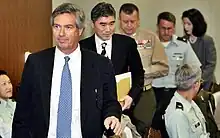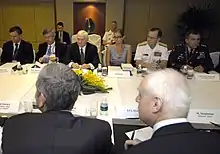James J. Shinn
James Joseph Shinn (born October 22, 1951)[1] is a technology entrepreneur, scholar, and former U.S. government official with a history in business, public service and foreign affairs.
James Joseph Shinn | |
|---|---|
 Shinn (front) leading the US Delegation to US-South Korean Defense Meetings on 8 April 2008 in Seoul, Korea | |
| Born | October 22, 1951 Mount Holly, New Jersey, U.S. |
| Nationality | American |
| Academic background | |
| Alma mater | Princeton University (BA, PhD) Harvard Business School (MBA) |
| Academic work | |
| Institutions | Georgetown University Walsh School of Foreign Service, Princeton University School of Engineering and Applied Science |
Education
Born in Mount Holly, New Jersey, Shinn earned his BA degree from Princeton University in 1973, followed by an MBA at Harvard in 1981.[1] He returned to complete his PhD at Princeton in 2001.
Career
Business career
Shinn worked as a second vice president at the Chase Manhattan Bank in 1974, in commercial lending, commodities, and foreign exchange, serving in New York, Tokyo and Hong Kong; Chase was acquired by J.P. Morgan in 2000.
Shinn began working in Silicon Valley at Advanced Micro Devices (AMD), a Sunnyvale, California-based semiconductor firm, including roles as product market engineer in the MOS Microprocessor Group, where he worked on the x86 architecture; district sales manager in New York/New Jersey; and then General Manager of Nihon AMD in Japan.
He then co-founded Dialogic, a telecommunications voice processing firm using digital signal processing (DSP)technology, with Nick Zwick, Ken Burkhardt, and Charles Walden, in 1983. Dialogic did an IPO in 1992 and was acquired by Intel for $780m in 1999, becoming Intel's Media and Signaling division.
After Dialogic he was an investor and advisor to a series of technology start-ups, including Haystack Labs, a cyber security start-up founded by Steven Smaha in 1989, focused on UNIX-based intrusion detection systems, acquired by Trusted Information Systems in 1997;[2] Longitude, a derivatives trading platform founded by Andrew Lawrence and Charles Walden in 1999, acquired by the ISE and Goldman Sachs in 2006; Modo Labs, an enterprise mobile engagement platform founded by Andrew Yu and a team from MIT[3] in 2010; and Kenshō Financial, a fintech data analytics firm founded by Daniel Nadler and a team from Harvard in 2013, acquired by S&P Global for $550m in 2018.[4] Shinn co-founded Predata, a New York- and Washington-based data analytics firm with applications in national security and information operations, with Andrew Choi, Collin Stedman, Hill Wyrough, John Alfieri, and Joshua Haecker, in 2015.[5] Predata was acquired by FiscalNote in 2021.
In financial markets, he co-founded Teneo Intelligence, a New York- and London-based geopolitical risk advisory group, with Kevin Kajiwara and Wolfango Piccoli, in 2012.[6] He served as a non-executive director on the supervisory board of CQS, Ltd, a London-based multi-strategy hedge fund with $18bn assets under management (AUM), founded by Michael Hintze in 1999.
He was an investor and advisor to Red Six, a Maryland- and Washington DC-based firm specializing in unmanned aerial systems (UAS) threat analysis, emulation, and protection, co-founded by Scott Crino and Andy Dreby in 2012,;[7] KMB Telematics, a software-controlled RADAR firm founded by Bryan Cattle, with applications in autonomous vehicles (AV) and counter-UAS(cUAS); and OMX Ventures, an Illinois-based biotechnology venture capital firm, founded by Craig Asher. In 2021 he joined Criteo S.A. as a senior advisor on digital currency solutions, and in 2022 joined the board of directors of Bitt, a provider of central bank digital currency (CBDC) platforms. In 2022 he was the first investor in SeekAI, a New York-based generative AI company founded by Sarah Nagy and joined the SeekAI board of directors. SeekAI uses natural language processing to automate SQL database queries.
U.S. Government career

Shinn began government service as an economic analyst in the State Department's Bureau of East Asian and Pacific Affairs in 1977, serving under Assistant Secretary Richard Holbrooke, working primarily on U.S.-Japan economic relations, including industrial structure policy, and the Tokyo Round of the Multilateral Trade Negotiations (MTN).
In 2002 to 2003 Shinn served as Public Delegate to the General Assembly of the United Nations. From 2003 until 2006, Shinn was the National Intelligence Officer (NIO) for East Asia at the Central Intelligence Agency and at the Office of the Director of National Intelligence (ODNI).
In 2007 he was confirmed by the U.S. Senate as Assistant Secretary of Defense for Asia, serving under Secretary Robert Gates.[8] At the Pentagon he worked primarily on policy problems related to the Peoples Republic of China; North Korea's nuclear program; and the U.S. security relationship with Japan, the Republic of Korea, India, Australia, Singapore, and Taiwan. http://english.hani.co.kr/arti/english_edition/e_national/280370.html He participated in policy-making with regard to the wars in Afghanistan and Pakistan, and was awarded the Distinguished Public Service medal.[9]
In 2020 Shinn rejoined the State Department as Senior Advisor to the Bureau for Economic Growth, Energy and the Environment, serving with Undersecretary Keith Krach, primarily working on technology policy vis-a-vis the PRC, including the Clean Network effort, on 5G telephony, semiconductors, cloud computing, artificial intelligence, and electronic payments systems.
Academic career
He was Senior Fellow for Asia at the Council on Foreign Relations from 1993 to 1996, where he authored several task force reports and books, including Riding the Tigers: American Commercial Diplomacy in Asia (1998), with Jeffrey Garten and Robert Zoellick;[10] The Tests of War and the Strains of Peace: The U.S.-Japan Security Relationship (1998), with Harold Brown and Richard Armitage;[11] Fires Across the Water: Transnational Problems in Asia (1998);[12] and Weaving the Net: Conditional Engagement with China (1996).[13]
Later, in 2002, Shinn worked with Jan Lodal at the Council on Foreign Relations on "Red-Teaming the Data Gap" (2002). From the project's synopsis: “This paper outlines the information technology requirements of an effective Homeland Defense strategy against further al-Qaeda terror strikes within the United States.”[14]
His other books include Afghan Peace Talks: A Primer (RAND Press, 2011), with James Dobbins, outlining the roadmap for a settlement of the War in Afghanistan; Political Power and Corporate Control: the New Global Politics of Corporate Governance (Princeton University Press, 2005), with Peter Gourevitch;[15] and "How Shareholder Reforms Can Pay Foreign Policy Dividends, also with Peter Gourevitch.
The Shinn-Dobbins book was based on the Century Foundation's Afghanistan: Negotiating Peace project, co-chaired by Thomas Pickering and Lakhdar Brahimi, during which the authors met with a spectrum of former and current Taliban leaders in Pakistan and Afghanistan, as well as senior officials in India, Iran, China, and Russia, in an effort to identify the contours of a viable political settlement to the War in Afghanistan, which at the time had been waged since 9/11.
Political Power and Corporate Control was reviewed in Foreign Affairs magazine as “Gourevitch and Shinn conduct comparative analysis....introducing cross-country quantitative analysis where that is possible and appropriate, but also offering analytical narratives on corporate governance, its likely origins, and the political and legal structures that support it in 13 countries. ”[16]
He was Visiting Lecturer at Princeton University's School of Engineering and Applied Science from 2009 to 2016,[17] where he taught a course on technical innovation, EGR 492, “Radical Innovation in Global Markets.”[18]
Philanthropy
Shinn served on the advisory board of the Department of Ophthalmology at New York-Presbyterian Columbia University Medical Center,;[19] provided seed capital for the formation of Princeton's Scholars in the Nation's Service (SINSI) program;[20] and as a donor to the Asia Foundation, for its programs empowering women in developing countries in Asia[21] and the Library Company of Burlington – chartered by George II in 1758—where he learned to read.[22]
References
- "Biographical and Financial Information Requested of Nominees". Nominations Before the Senate Armed Services Committee, First Session, 110th Congress (PDF). Washington, D.C.: U.S. Government Printing Office. 2008. pp. 1256–1258. Retrieved 2021-05-29.
- Ricciuti, Mike. "Short Take: TIS to acquire Haystack". CNET. Retrieved 2021-02-22.
- "Modo Labs | Mobile Apps for Employees & Universities". Modo Labs. Retrieved 2021-02-22.
- "S&P Global snares Kensho for $550 million". TechCrunch. 7 March 2018. Retrieved 2021-02-22.
- "This NYC Startup is Using Data to Predict World Events". AlleyWatch. 2018-03-20. Retrieved 2021-02-22.
- "Country Political & Policy Risk Assessment". Teneo. Retrieved 2021-02-22.
- Inc, Liteye Systems. "Liteye and Red Six "Sharpen Their Blade" Against the Iranian Small UAS Threat". www.prnewswire.com (Press release). Retrieved 2021-02-22.
{{cite press release}}:|last=has generic name (help) - "Shinn named as assistant secretary of defense for Asian and Pacific security affairs". Stars and Stripes. Retrieved 2021-02-22.
- "Department of Defense Distinguished Civilian Service Award", Wikipedia, 2020-11-23, retrieved 2021-02-22
- "Riding the Tigers". Council on Foreign Relations. Retrieved 2021-02-22.
- https://cdn.cfr.org/sites/default/files/pdf/2005/08/Tests_of_War.pdf
- www.amazon.com https://www.amazon.com/s?k=Shinn+Fires+Across+the+water&i=stripbooks&ref=nb_sb_noss. Retrieved 2021-02-22.
{{cite web}}: Missing or empty|title=(help) - Shinn, James (1996). Weaving the Net: Conditional Engagement with China. ISBN 0876091907.
- "Red-Teaming the Data Gap". Council on Foreign Relations. Retrieved 2021-02-26.
- Morck, Randall. The International History Review, vol. 29, no. 1, 2007, pp. 223–225. JSTOR. Accessed 8 Jan. 2020.
- "Political Power and Corporate Control: The New Global Politics of Corporate Governance". Foreign Affairs. 2009-01-28. ISSN 0015-7120. Retrieved 2021-02-22.
- "When new technologies pose public-policy dilemmas". Princeton Alumni Weekly. 2016-01-21. Retrieved 2021-02-22.
- "Course Details | Office of the Registrar". registrar.princeton.edu. Retrieved 2021-02-22.
- "Columbia Ophthalmology". www.columbiaeye.org. Retrieved 2021-02-26.
- "Scholars in the Nation's Service Initiative (SINSI) | Office of Undergraduate Research". undergraduateresearch.princeton.edu. Retrieved 2021-02-26.
- "The Asia Foundation". The Asia Foundation. Retrieved 2021-02-26.
- "Welcome to Library Company of Burlington". Library Company of Burlington. Retrieved 2021-02-26.